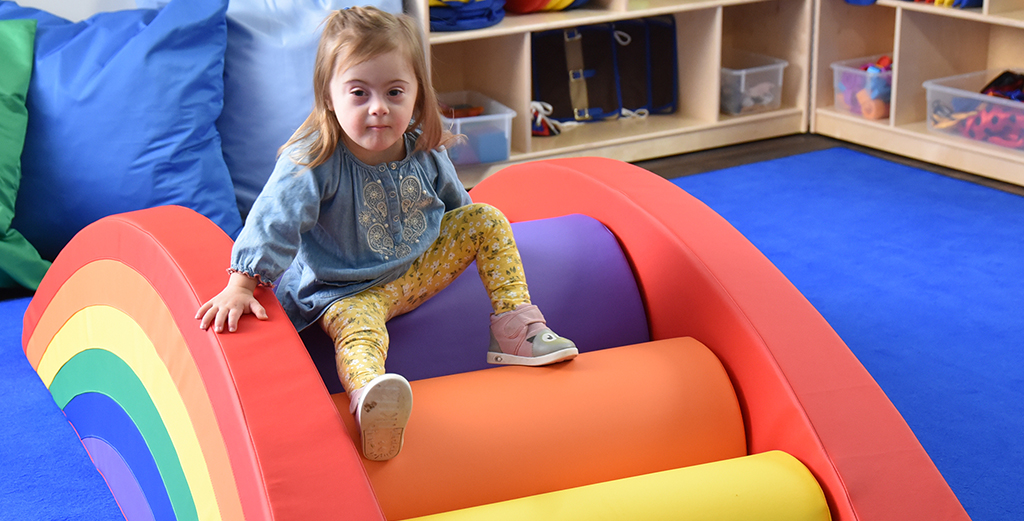
Classroom Trends: Are Rainbows Trendy or Timeless?
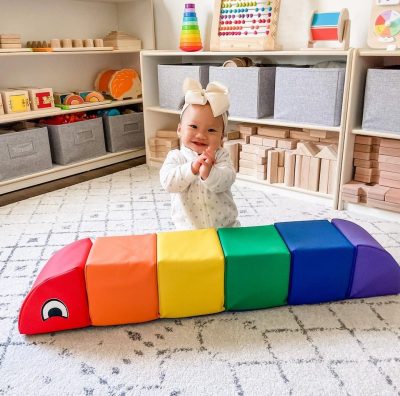
The Baby Inchworm let’s little ride the rainbow till they find the pot ‘o’ gold. Turn it on it’s side and it doubles as a sit me up!
Some classroom trends only endure for a season or two, but rainbows seem to never go out of style. They’re an inspiring phenomenon. When we gaze into the sky to see a rainbow pointing us toward the sun and beyond, we feel a sense of awe no matter our age. Yet, after a year of dealing with COVID, many schools might be asking the questions, “Can we really justify investing in rainbow-izing our classrooms? Are rainbows just trendy like llamas and sloth bears were last year or baby elephants this year? Or are rainbows truly timeless?”
Classroom Trends and STEM Learning
Rainbows encourage children to begin thinking about the world from the perspective of science and mathematics. Without flare, STEM learning activities will fail to pique the interest of our littles every time. They have the kind of pizzazz people of all ages find engaging. Therefore, if we know rainbows are timeless and trending now, the question isn’t why invest, it becomes why wait?
Refraction Gives Rainbows Color
Most of us know on a bright sunny day, the sunlight we see isn’t really one color, but a happy blend of many colors combined. Light is perceived in different wavelengths and every color of the rainbow has a different wavelength associated with it. Violet is a much shorter wavelength than red for example. And all the other colors fall somewhere in between violet and red.
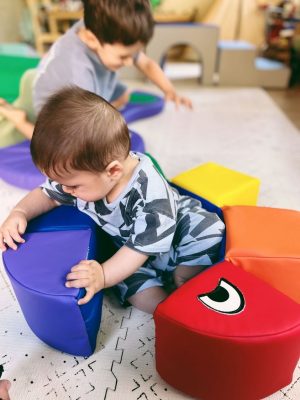 Rainbows commonly occur after it rains, and indeed, the raindrops play a key role in the creation of a rainbow. As light enters the water, it changes direction. This is referred to as refraction. When children place a colorful straw in a transparent glass of water, they often note how the straw looks bent. This is another example of refraction at work. The light enters the glass of water at an angle and then bends.
Rainbows commonly occur after it rains, and indeed, the raindrops play a key role in the creation of a rainbow. As light enters the water, it changes direction. This is referred to as refraction. When children place a colorful straw in a transparent glass of water, they often note how the straw looks bent. This is another example of refraction at work. The light enters the glass of water at an angle and then bends.
For rainbows, the colors with the shortest wavelengths change direction the most when they hit the water droplets in the air. Violet light changes direction to the greatest degree. Each subsequent color changes less and less the last color in the rainbow sequence, which is red. Red possesses the longest wavelength making it the least affected color. Refraction is responsible for our eyes perceiving all the colors when we see a rainbow in the sky.
Reflection Gives Rainbows Shape
Now we will dig a bit deeper into science and math. Rainbows get their signature bow or rounded shape from sunlight reflecting off the raindrops. The human eye perceives this reflected light as it bounces off the raindrops. Sunlight happens to reflect most strongly at a 42-degree angle. If you have ever seen a faint rainbow versus a vivid rainbow, it was probably due to the angle the light was bouncing off the raindrops.
Rainbow-ize Your Classroom in 5 Easy Steps
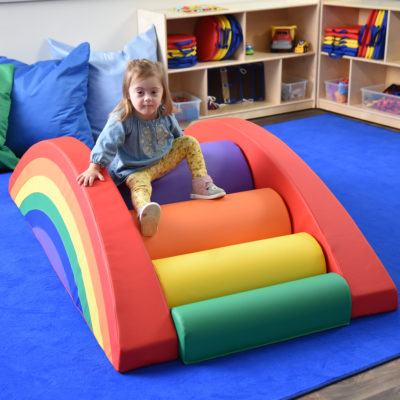
The Rainbow Arch Climber (CF321-207) is a timeless favorite. Constructed using durable foam and vegan leather, kids can climb, crawl, play and socialize.
Children’s Factory’s Rainbow Arch Climber is the amazing, all-in-one, climbing and crawling soft play piece you can add to your classroom to rainbow-ize it in seconds. The bright fun colors give it the kind pizzazz that never goes out of style.
Similarly, the Rainbow Arch Trio can be used together as one piece or separated and used as ride-on rockers for balance. With rainbows being so much fun, why not teach kids to share.
Kids will undoubtedly be inspired by both climbers. Benefits include:
- Develops gross motor skills, such as balance and coordination as kids play.
- Social – this piece allows littles to enter from 360 degrees to ensure every child can join the fun.
- Teachers and caregivers can use the rainbow to introduce kids to STEM ideas like reflection and refraction.
- Playing color identification games with littles is a fun way to merge learning and fun into one activity!
Rainbow Hopscotch Play Carpet (LC308)
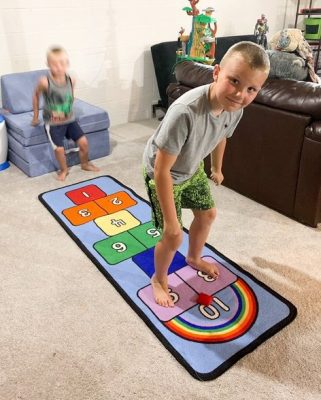 Hopscotch is an iconic classic from generation to generation. Children learn how to count as they toss the beanbags and hop from space to space. Hopscotch activities develop gross motor skills and have many of the same advantages as the Rainbow Arch Climber. As far as classroom trends go, this one is not going to fade away anytime soon!
Hopscotch is an iconic classic from generation to generation. Children learn how to count as they toss the beanbags and hop from space to space. Hopscotch activities develop gross motor skills and have many of the same advantages as the Rainbow Arch Climber. As far as classroom trends go, this one is not going to fade away anytime soon!
Rainbow Circle Seats – Set of 6 with Mat (CF805-014)
When a smaller, flexible learning space is a priority, try this 6-piece Rainbow Circle Seat Set. With 6 curved pieces grouping around a 36” diameter mat, these soft, foam seats can be grouped in a circle to engage kids in a group activity where collaboration is required or the seats can be arranged in a theater formation with kids focusing on the teachers.
Nora’s Piano Climber (CF810-009)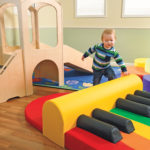
Before littles work on the fine motor skills required to play the piano, they can improve balance and coordination by climbing and crawling on the brightly colored piano keys. The rear side of the yellow hump features a soft mat where tikes can enjoy story hour, a snack, or read a book.
Rainbow Mosaic Educational Rug (CPR3009)
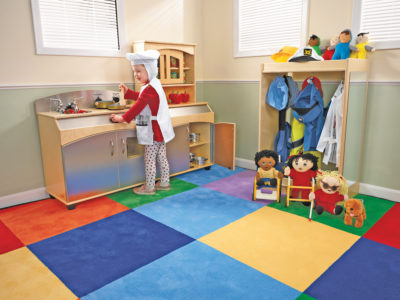
Rainbow Mosaic Rug (CPR3009) lends a bohemian feel to any space. Add an array of colorful pieces – this carpet will complement almost any piece with primary or secondary colors.
Children’s Factory Educational Rugs are always a great place to start when designing a flexible learning space. This choice has all the rainbow-rific colors you might be seeking, plus a simple design making it easy to partner with a lot of other pieces.
Timeless Classroom Trends Endure
It turns out sloths are too slow to keep up with the trends and the llamazing animals of last year have been replaced with new ones. Conversely, the end of every rainbow is said to have a pot of gold waiting for savvy searchers and legends state mythical creatures like unicorns leave only rainbow-colored skat as a sign they passed through a neighborhood. These myths just prove rainbows have an enduring power over our minds. We love their elusive nature. They appear and then disappear just as quickly like a scoop of rainbow sherbet on a hot summer day. If we can use the passion rainbows inspire to help kids become just as passionate about STEM learning, then rainbow-izing our classrooms seems like a pot of gold just waiting to be found.
Buy it on Amazon:
Buy it on Wayfair: